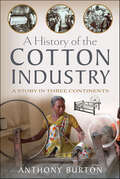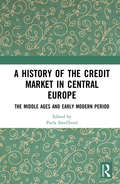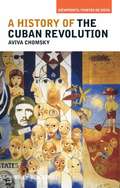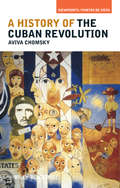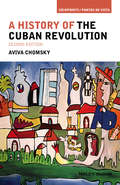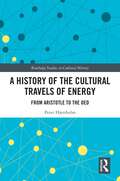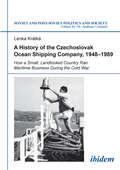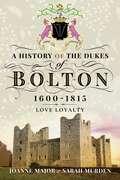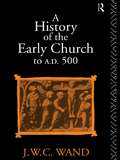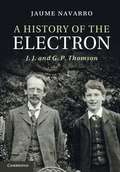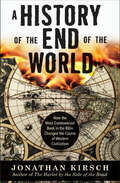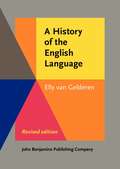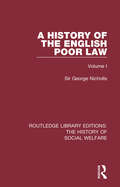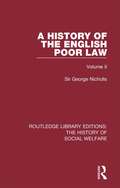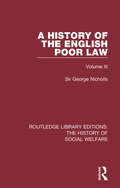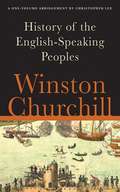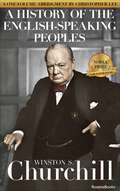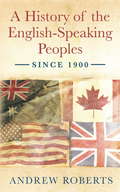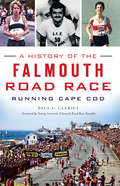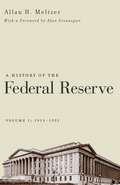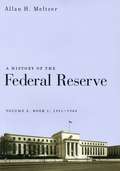- Table View
- List View
A History of the Cotton Industry: A Story in Three Continents
by Anthony BurtonThis book is about technology and how it has changed the lives of people on three continents over the last three hundred years. The development of the cotton industry was the starting point for one of the great turning points in history – the industrial revolution. It began with the importation of cloth into Britain from India and that created a new fashion. As the demand for cotton cloth grew, British inventors began to find ways of making the same cloth using powered machinery and built the first cotton mills. The old way of life of the textile workers was transformed, as work moved from home to factory and thousands of small children were brought in to tend the new machines. If conditions in the cotton towns were bad, they were far worse in America where, thanks to the work of slaves, the country took over the supply of raw material from India. During the American Civil War, Britain turned again to India for its supplies. Today, positions have changed dramatically. India again has a thriving industry, while in Britain only a fraction of the old mills are still at work. The author looks in detail at the technology that produced the changes, but the emphasis is very much on the human stories of the industrialists and their workers, the planters and their slaves in Britain, India and America.
A History of the Credit Market in Central Europe: The Middle Ages and Early Modern Period
by Pavla SlavíčkováThis is the first comprehensive study of loans and debts in Central European countries in the Middle Ages and Early Modern Period. It outlines the issues of debts and loans in the Czech lands, Poland and Hungary, with respect to the influence of Austria and Germany. It focuses on the role of loans and debts in medieval and early modern society, credit markets in these countries, the mechanism of lending and borrowing, forms of credit, availability of loans, frequency of credits dealings, range of lending business, and last, but not least, the financial relationships inside the social classes and between them. The research presented in the book is based on a wide range of resources including credit contracts and agreements, evidence of loans and debts of courts, accounting of nobility, towns, churches and guilds, merchant diaries and Jewish registers, as well as other financial records. It covers a wide range of historical disciplines including economic and financial history, social history, the history of economic thought as well as the history of everyday life. It also contains a wealth of case studies, which offer, for the first time in English, a comprehensive and representative sample of the most up-to-date Central European research on the history of loans and debts and serves as a basis for a comparison with the other parts of Europe during the same period. The book is designed primarily for postgraduates, researchers and academics in financial, economic and historical sciences but will also be a valuable resource for students of business schools.
A History of the Cuban Revolution
by Aviva ChomskyA History of the Cuban Revolution presents a concise socio-historical account of the Cuban Revolution of 1959, an event that continues to spark debate 50 years later. Balances a comprehensive overview of the political and economic events of the revolution with a look at the revolution's social impact Provides a lively, on-the-ground look at the lives of ordinary people Features both U. S. and Cuban perspectives to provide a complete and well-rounded look at the revolution and its repercussions Encourages students to understand history through the viewpoint of individuals living it Selected as a 2011 Outstanding Academic Title by CHOICE
A History of the Cuban Revolution (Viewpoints / Puntos de Vista #13)
by Aviva ChomskyA History of the Cuban Revolution presents a concise socio-historical account of the Cuban Revolution of 1959, an event that continues to spark debate 50 years later. Balances a comprehensive overview of the political and economic events of the revolution with a look at the revolution’s social impact Provides a lively, on-the-ground look at the lives of ordinary people Features both U.S. and Cuban perspectives to provide a complete and well-rounded look at the revolution and its repercussions Encourages students to understand history through the viewpoint of individuals living it Selected as a 2011 Outstanding Academic Title by CHOICE
A History of the Cuban Revolution (Viewpoints / Puntos de Vista #13)
by Aviva ChomskyA fully-revised and updated new edition of a concise and insightful socio-historical analysis of the Cuban revolution, and the course it took over five and a half decades. Now available in a fully-revised second edition, including new material to add to the book’s coverage of Cuba over the past decade under Raul Castro All of the existing chapters have been updated to reflect recent scholarship Balances social and historical insight into the revolution with economic and political analysis extending into the twenty-first century Juxtaposes U.S. and Cuban perspectives on the historical impact of the revolution, engaging and debunking the myths and preconceptions surrounding one of the most formative political events of the twentieth century Incorporates more student-friendly features such as a timeline and glossary
A History of the Cultural Travels of Energy: From Aristotle to the OED (Routledge Studies in Cultural History)
by Peter HjertholmThis book offers a cultural history of the travels of energy in the English language, from its origins in Aristotle’s ontology, where it referred to the activity-of-being, through its English usage as a way to speak about the inherent nature of things, to its adoption as a name for the mechanics of motion (capacity for work). A distinguished literature deals with energy as matter of science history. But this literature fails to adequately answer a historical question about the rise of the science of energy: How did the commonplace word ‘energy’ end up becoming a concept in science? This account differs in important ways from the history of the word in the Oxford English Dictionary. Discovering the origins and early travels of energy is essential for understanding how the word was borrowed into physics, and therefore a cultural history of energy is a necessary companion to the science history of the term. It is important that modern scholars in a variety of fields be aware that energy did not always have a scientific content. The absence of that awareness can lead to, have led to, anachronistic interpretations of energy in historical sources from before the 1860s. A History of the Cultural Travels of Energy will be useful for those interested in the history of science and technology, cultural history, and linguistics.
A History of the Czechoslovak Ocean Shipping Company, 1948–1989: How a Small, Landlocked Country Ran Maritime Business During the Cold War (Soviet and Post-Soviet Politics and Society #146)
by Lenka KrátkáThis book offers a comprehensive history of the Czechoslovak Ocean Shipping Company (C. O. S.) from its beginning in the late 1940s until the fall of communism. Owned by the Czechoslovak state, C. O. S.'s activities were shaped by Soviet standards. This unique study is structured according to the different phases of the Cold War and highlights the political aspects that determined C. O. S.'s fate. Lenka Krátká focuses on two contradictory economic dimensions that C. O. S. had to engage with. Being part of the planned economy of a socialist state, it also dealt with companies in the capitalist West. Another paradoxical aspect of C. O. S. emerges from the memories of former Czechoslovak seamen, who experienced relative freedom when being aboard and strict communist regime control while at home with their families. Krátká's book offers fascinating insights into a neglected topic, using thus far untapped sources and building on primary research in oral history and personal memory.
A History of the Dukes of Bolton, 1600–1815: Love Loyalty
by Joanne Major Sarah MurdenA first-ever account of one of the United Kingdom’s foremost ducal families and a history of the times in which they lived.Discover over two hundred years of fascinating history relating to one of Great Britain’s foremost aristocratic dynasties, the (Orde-) Powletts, for several generations the Dukes of Bolton. The family motto, Love Loyalty, references their devotion to the monarchy, but it applies equally to their hearts. Willing to risk all in the pursuit of love, this is the previously untold story of the Dukes of Bolton and their ancestors—the men and women who shaped the dynasty, their romances, triumphs, foibles, and tragedies.
A History of the Early Church to AD 500
by John William WandDr Wand's classic treatment of the early church is concise, comprehensive and makes use of specialist treatises. The organisation of material and lucid style make accessible what is at times a complex subject. In addition, the book is full of vignettes of prominent personages and curious items of information.Interesting and informative, A History of Early Church caters for the general reader with an interest in history as well as the religious studies student fow whom it is principally intended.
A History of the Electron
by Jaume NavarroTwo landmarks in the history of physics are the discovery of the particulate nature of cathode rays (the electron) by J. J. Thomson in 1897 and the experimental demonstration by his son G. P. Thomson in 1927 that the electron exhibits the properties of a wave. Together, the Thomsons are two of the most significant figures in modern physics, both winning Nobel prizes for their work. This book presents the intellectual biographies of the father-and-son physicists, shedding new light on their combined understanding of the nature of electrons and, by extension, of the continuous nature of matter. It is the first text to explore J. J. Thomson's early and later work, as well as the role he played in G. P. Thomson's education as a physicist and how he reacted to his son's discovery of electron diffraction. This fresh perspective will interest academics and graduate students working in the history of early twentieth-century physics.
A History of the End of the World: How the Most Controversial Book in the Bible Changed the Course of Western Civilization
by Jonathan Kirsch"[The Book of] Revelation has served as a "language arsenal" in a great many of the social, cultural, and political conflicts in Western history. Again and again, Revelation has stirred some dangerous men and women to act out their own private apocalypses. Above all, the moral calculus of Revelation—the demonization of one's enemies, the sanctification of revenge taking, and the notion that history must end in catastrophe—can be detected in some of the worst atrocities and excesses of every age, including our own. For all of these reasons, the rest of us ignore the book of Revelation only at our impoverishment and, more to the point, at our own peril."The mysterious author of the Book of Revelation (or the Apocalypse, as the last book of the New Testament is also known) never considered that his sermon on the impending end times would last beyond his own life. In fact, he predicted that the destruction of the earth would be witnessed by his contemporaries. Yet Revelation not only outlived its creator; this vivid and violent revenge fantasy has played a significant role in the march of Western civilization. Ever since Revelation was first preached as the revealed word of Jesus Christ, it has haunted and inspired hearers and readers alike. The mark of the beast, the Antichrist, 666, the Whore of Babylon, Armageddon, and the Four Horsemen of the Apocalypse are just a few of the images, phrases, and codes that have burned their way into the fabric of our culture. The questions raised go straight to the heart of the human fear of death and obsession with the afterlife. Will we, individually or collectively, ride off to glory, or will we drown in hellfire for all eternity? As those who best manipulate this dark vision learned, which side we fall on is often a matter of life or death. Honed into a weapon in the ongoing culture wars between states, religions, and citizenry, Revelation has significantly altered the course of history. Kirsch, whom the Washington Post calls "a fine storyteller with a flair for rendering ancient tales relevant and appealing to modern audiences," delivers a far-ranging, entertaining, and shocking history of this scandalous book, which was nearly cut from the New Testament. From the fall of the Roman Empire to the Black Death, the Inquisition to the Protestant Reformation, the New World to the rise of the Religious Right, this chronicle of the use and abuse of the Book of Revelation tells the tale of the unfolding of history and the hopes, fears, dreams, and nightmares of all humanity.
A History of the English Language (Revised Edition)
by Elly Van GelderenThe English language in its complex shapes and forms changes fast. This thoroughly revised edition has been refreshed with current examples of change and has been updated regarding archeological research. Most suggestions brought up by users and reviewers have been incorporated, for instance, a family tree for Germanic has been added, Celtic influence is highlighted much more, there is more on the origin of Chancery English, and internal and external change are discussed in much greater detail. The philosophy of the revised book remains the same with an emphasis on the linguistic history and on using authentic texts. My audience remains undergraduates (and beginning graduates). The goals of the class and the book are to come to recognize English from various time periods, to be able to read each stage with a glossary, to get an understanding of typical language change, internal and external, and to understand something about language typology through the emphasis on the change from synthetic to analytic. This book has a companion website: http://dx. doi. org/10. 1075/z. 183. website
A History of the English Poor Law: Volume I (Routledge Library Editions: The History of Social Welfare #13)
by Sir George NichollsFirst published in 1854, this comprehensive work charts over three volumes the history of poor relief in England from the Saxon period through to the establishment of the Poor Law Amendment Act in 1834 and its reception. This edition, updated in 1898, also includes a biography of the author, Sir George Nicholls. Volume I examines poor relief from the Saxon period to the reign of Queen Anne. This set of books will be of interest to those studying the history of the British welfare state and social policy.
A History of the English Poor Law: Volume II (Routledge Library Editions: The History of Social Welfare #13)
by Sir George NichollsFirst published in 1854, this comprehensive work charts over three volumes the history of poor relief in England from the Saxon period through to the establishment of the Poor Law Amendment Act in 1834 and its reception. This edition, updated in 1898, also includes a biography of the author, Sir George Nicholls. Volume I examines poor relief from the accession of George I to 1854. This set of books will be of interest to those studying the history of the British welfare state and social policy.
A History of the English Poor Law: Volume III (Routledge Library Editions: The History of Social Welfare #13)
by Sir George NichollsFirst published in 1854, this comprehensive work charts over three volumes the history of poor relief in England from the Saxon period through to the establishment of the Poor Law Amendment Act in 1834 and its reception. This edition, updated in 1898, also includes a biography of the author, Sir George Nicholls. Volume III examines poor relief from 1834 to 1898. This set of books will be of interest to those studying the history of the British welfare state and social policy.
A History of the English-Speaking Peoples
by Winston ChurchillAn authoritative survey of the history of English-speaking peoples throughout the world combines intriguing, closely observed biographical profiles--of Alfred the Great, Victoria, Joan of Arc, Lincoln, and other notables--with an account of the key events and issues of the era. The narrative commences fifty-five years before the birth of Christ, when Julius Caesar famously "turned his gaze upon Britain,” and concludes in the year 1900. The beginnings of Parliament, the Church, and the monarchy are all analyzed alongside this comprehensive abridgment.
A History of the English-Speaking Peoples Collection: A One-Volume Abridgment by Christopher Lee (A History of the English-Speaking Peoples)
by Winston S. ChurchillThe magnificent history of Britain by the legendary statesman and winner of the Nobel Prize in Literature, now condensed in one volume. A History of the English-Speaking Peoples stands as one of Winston S. Churchill's most extraordinary literary works. Begun during the &“wilderness years&” when he was out of government, first published in 1956 after his leadership through the darkest days of World War II had cemented his place in history, and completed when Churchill was in his eighties, it remains to this day a compelling and vivid account. This one-volume abridged edition of Churchill&’s major work makes accessible to readers the full sweep of his magisterial chronicle.
A History of the English-Speaking Peoples since 1900
by Andrew RobertsPrize-winning British historian tells the story of the English-speaking peoples in the 20th centuryWinston Churchill's History of the English-Speaking Peoples ended in 1900. Andrew Roberts, Wolfson History prizewinner has been inspired by Churchill's example to write the story of the 20th century.Churchill wrote: 'Every nation or group of nations has its own tale to tell. Knowledge of the trials and struggles is necessary to all who would comprehend the problems, perils, challenges, and opportunities which confront us today 'It is in the hope that contemplation of the trials and tribulations of our forefathers may not only fortify the English-speaking peoples of today, but also play some small part in uniting the whole world, that I present this account.'As the greatest of all the trials and tribulations of the English-speaking peoples took place in the twentieth century, Roberts' book covers the four world-historical struggles in which the English-speaking peoples have been engaged - the wars against German Nationalism, Axis Fascism, Soviet Communism and now the War against Terror. But just as Churchill did in his four volumes, Roberts also deals with the cultural, social and political history of the English global diaspora.
A History of the English-Speaking Peoples since 1900
by Andrew RobertsPrize-winning British historian tells the story of the English-speaking peoples in the 20th centuryWinston Churchill's History of the English-Speaking Peoples ended in 1900. Andrew Roberts, Wolfson History prizewinner has been inspired by Churchill's example to write the story of the 20th century.Churchill wrote: 'Every nation or group of nations has its own tale to tell. Knowledge of the trials and struggles is necessary to all who would comprehend the problems, perils, challenges, and opportunities which confront us today 'It is in the hope that contemplation of the trials and tribulations of our forefathers may not only fortify the English-speaking peoples of today, but also play some small part in uniting the whole world, that I present this account.'As the greatest of all the trials and tribulations of the English-speaking peoples took place in the twentieth century, Roberts' book covers the four world-historical struggles in which the English-speaking peoples have been engaged - the wars against German Nationalism, Axis Fascism, Soviet Communism and now the War against Terror. But just as Churchill did in his four volumes, Roberts also deals with the cultural, social and political history of the English global diaspora.
A History of the English-Speaking Peoples, Volume II: The New World
by Winston ChurchillCovers the development of English history from the fall of Richard III to 1688. During this period, the New World was explored and developed, but there was also a New World resulting from the Renaissance and Enlightenment.
A History of the English-Speaking Peoples, Volume III: The Age of Revolution
by Winston ChurchillEnglish history from 1688 to 1815. This period includes the English, French, and American revolutions, all of which had enormous impact on world development.
A History of the Falmouth Road Race: Running Cape Cod (Sports)
by Paul C. ClericiThe seven-mile Falmouth Road Race catapulted Cape Cod onto the running radar. Frank Shorter winning gold in the 1972 Olympic marathon inspired local barkeep Tommy Leonard to start a race in his own town. That inaugural race in 1973 garnered fewer than one hundred runners. Participation soon swelled to the thousands, thanks to the success of organizers, volunteers, and talented fields, including running legends like Bill Rodgers and Catherine Ndereba, as well as wheelchair champions Bob Hall and Tatyana McFadden. Follow author Paul C. Clerici along every bend and uphill battle of the race's history from the early stages of the running boom to resetting the road-racing calendar.
A History of the Far East in Modern Times
by Harold M. VinackeHarold M. Vinacke's "A History of the Far East in Modern Times" offers a nuanced exploration of the Far East's evolution from the 19th century to the post-World War II era. Originally focusing on China, Japan, Korea, and Russian territories east of Lake Baikal, the book traces the region's journey into modernity, defined within its own context rather than through a Eurocentric lens. The narrative skillfully weaves through the separate historical trajectories of Japan and China until converging events, such as the struggle over Korea, bring them together. The sixth edition expands on the fifth, incorporating World War II and postwar developments, with particular attention to Southeast Asia, Indonesia, the Philippines, Communist China, Korea, and post-occupation Japan. Vinacke's work provides a foundation for understanding the complex socio-political changes in this dynamic region.
A History of the Federal Reserve, Volume 1: 1913-1951
by Allan H. MeltzerAllan H. Meltzer's monumental history of the Federal Reserve System tells the story of one of America's most influential but least understood public institutions. This first volume covers the period from the Federal Reserve's founding in 1913 through the Treasury-Federal Reserve Accord of 1951, which marked the beginning of a larger and greatly changed institution.
A History of the Federal Reserve, Volume 2, Book 1: 1951-1969
by Allan H. MeltzerAllan H. Meltzer's critically acclaimed history of the Federal Reserve is the most ambitious, most intensive, and most revealing investigation of the subject ever conducted. Its first volume, published to widespread critical acclaim in 2003, spanned the period from the institution's founding in 1913 to the restoration of its independence in 1951. This two-part second volume of the history chronicles the evolution and development of this institution from the Treasury-Federal Reserve accord in 1951 to the mid-1980s, when the great inflation ended. It reveals the inner workings of the Fed during a period of rapid and extensive change. An epilogue discusses the role of the Fed in resolving our current economic crisis and the needed reforms of the financial system. In rich detail, drawing on the Federal Reserve's own documents, Meltzer traces the relation between its decisions and economic and monetary theory, its experience as an institution independent of politics, and its role in tempering inflation. He explains, for example, how the Federal Reserve's independence was often compromised by the active policy-making roles of Congress, the Treasury Department, different presidents, and even White House staff, who often pressured the bank to take a short-term view of its responsibilities. With an eye on the present, Meltzer also offers solutions for improving the Federal Reserve, arguing that as a regulator of financial firms and lender of last resort, it should focus more attention on incentives for reform, medium-term consequences, and rule-like behavior for mitigating financial crises. Less attention should be paid, he contends, to command and control of the markets and the noise of quarterly data. At a time when the United States finds itself in an unprecedented financial crisis, Meltzer's fascinating history will be the source of record for scholars and policy makers navigating an uncertain economic future.
